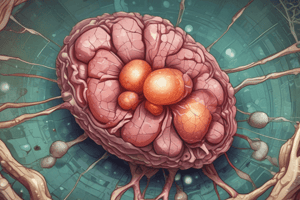Podcast
Questions and Answers
What dietary factor can lead to a decrease in calcium levels in bones?
What dietary factor can lead to a decrease in calcium levels in bones?
- High levels of carbohydrates
- High levels of iron
- Low levels of calcium (correct)
- High levels of fiber
Which dietary component, when consumed in excess, might negatively affect calcium balance?
Which dietary component, when consumed in excess, might negatively affect calcium balance?
- Vitamin C
- Fiber
- Protein (correct)
- Potassium
What is a potential consequence of long-term use of vitamin D and calcium supplements?
What is a potential consequence of long-term use of vitamin D and calcium supplements?
- Improved digestion
- Reduced risk of fractures
- Excess calcium in the blood (correct)
- Increased bone density
Which of the following dietary factors is NOT mentioned as contributing to calcium movement from bones to blood?
Which of the following dietary factors is NOT mentioned as contributing to calcium movement from bones to blood?
How does a diet with high levels of glucose potentially affect calcium levels?
How does a diet with high levels of glucose potentially affect calcium levels?
What is the primary purpose of the dye mentioned?
What is the primary purpose of the dye mentioned?
Which of the following is a limitation of the dye?
Which of the following is a limitation of the dye?
Which anatomical structures can be visualized with the dye?
Which anatomical structures can be visualized with the dye?
What type of medical condition can the dye help detect?
What type of medical condition can the dye help detect?
What aspect of kidney stones is NOT determined by the dye?
What aspect of kidney stones is NOT determined by the dye?
What is the primary purpose of an ultrasound of the kidney?
What is the primary purpose of an ultrasound of the kidney?
Which statement about the ultrasound procedure is most accurate?
Which statement about the ultrasound procedure is most accurate?
What advantage does ultrasound have over other imaging techniques for kidney evaluation?
What advantage does ultrasound have over other imaging techniques for kidney evaluation?
In which scenario would an ultrasound be considered a suitable diagnostic tool?
In which scenario would an ultrasound be considered a suitable diagnostic tool?
What limitation should be considered when using ultrasound for kidney assessment?
What limitation should be considered when using ultrasound for kidney assessment?
What is the primary purpose of ureteroscopy and laser lithotripsy?
What is the primary purpose of ureteroscopy and laser lithotripsy?
Which of the following tools is primarily used during ureteroscopy to assist in breaking up stones?
Which of the following tools is primarily used during ureteroscopy to assist in breaking up stones?
In which part of the urinary tract is the flexible tube inserted during ureteroscopy?
In which part of the urinary tract is the flexible tube inserted during ureteroscopy?
What characteristic of the tube used in ureteroscopy helps in visual inspection during the procedure?
What characteristic of the tube used in ureteroscopy helps in visual inspection during the procedure?
Which of the following statements about ureteroscopy and laser lithotripsy is TRUE?
Which of the following statements about ureteroscopy and laser lithotripsy is TRUE?
What is the recommended daily urine output to help prevent further stone formation?
What is the recommended daily urine output to help prevent further stone formation?
Which of the following measures is NOT suggested to avoid further stone formation?
Which of the following measures is NOT suggested to avoid further stone formation?
Why is a high fluid intake critical for patients at risk of kidney stones?
Why is a high fluid intake critical for patients at risk of kidney stones?
What volume of urine output per day is necessary for effective prevention of stone formation?
What volume of urine output per day is necessary for effective prevention of stone formation?
Which of the following is a strategy to promote high fluid intake?
Which of the following is a strategy to promote high fluid intake?
Study Notes
Contributing Factors to Kidney Stone Formation
- High protein, salt, or glucose intake can increase the risk of kidney stone formation.
- Low calcium levels in the diet can lead to the body drawing calcium from bones, increasing the risk of stones.
- Long-term use of vitamin D and calcium supplements can also contribute to stone formation.
Diagnosis of Kidney Stones
- Intravenous Pyelogram (IVP) is a dye-based imaging technique.
- It helps visualize the kidneys, ureters, and bladder.
- Can detect the presence of stones.
- May not be able to determine the size or composition of the stones.
- Ultrasound of the Kidney: is a non-invasive procedure that uses sound waves to produce images of the kidneys.
- Can detect the presence of stones and assess their size and location.
Treatment of Kidney Stones
- Ureteroscopy and Laser Lithotripsy: minimally invasive procedure involving inserting a thin, flexible tube with a camera into the urethra and bladder.
- A laser is used to break up the stones.
Prevention and Management of Kidney Stones
- Encourage patients to maintain a high fluid intake.
- Aim for 3,000 to 4,000 mL of urine excretion every 24 hours.
- Advise patients to follow a regimen to prevent further stone formation.
Studying That Suits You
Use AI to generate personalized quizzes and flashcards to suit your learning preferences.
Related Documents
Description
This quiz covers the contributing factors that lead to kidney stone formation, including dietary influences and supplement usage. It also details diagnostic techniques like IVP and ultrasound, as well as treatment options such as ureteroscopy. Test your knowledge on this important health topic.



